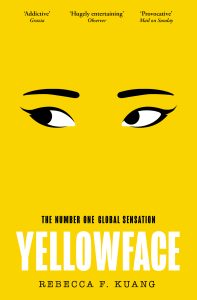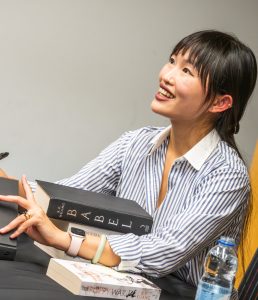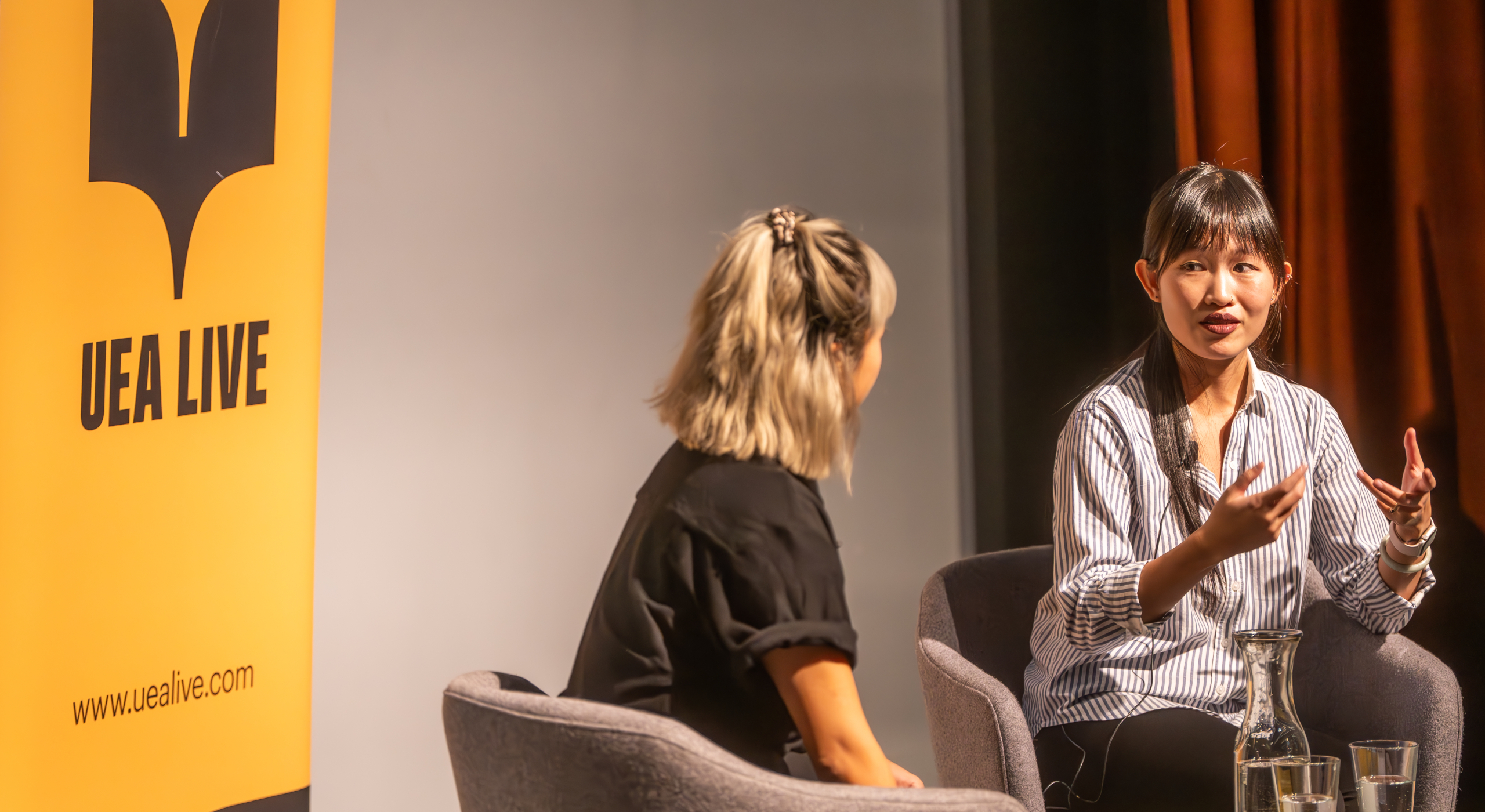Yellowface: The Art of Stealing Manuscripts
Written for UEA Live by Dhara Ranavaya
On October 16th, UEA Live hosted an incredible conversation with Rebecca F. Kuang, the acclaimed author of Yellowface.
As a Student Ambassador and professional reporter writing a feature, I had the unique privilege of working behind the scenes and having the opportunity to meet Rebecca before the talk! We escorted Rebecca from the green room into the bustling, packed Lecture Theatre 1 where eager students, staff and readers awaited. The air bustled with excitement.
As the lights dimmed, the spotlight shifted to Rebecca, who smiled serenely in front of 500 people in the room. I took my seat in the front row, my heart racing. There she was – one of my biggest literary inspirations, my favourite author. And she had come to UEA!
 Rebecca began by reflecting on the beginnings of Yellowface, which emerged in a rapid burst of creativity, starkly contrasting the intensive, painstaking processes behind her previous works, The Poppy War and Babel. Yellowface was born quickly – a fast-paced, flurry of ideas, much like the novel itself. It emerged during the throes of the Covid-19 pandemic when the world shut down and social media erupted. In this surge of frenzied social media discourse, brimming with frustrations and painful cultural conversations on racism and appropriation, Rebecca (being ‘chronically online,’ as she joked) thought of writing a ‘social media novel.” A book buzzing with the thrill of news, teaming with texts, Twitter gossip and rumours.
Rebecca began by reflecting on the beginnings of Yellowface, which emerged in a rapid burst of creativity, starkly contrasting the intensive, painstaking processes behind her previous works, The Poppy War and Babel. Yellowface was born quickly – a fast-paced, flurry of ideas, much like the novel itself. It emerged during the throes of the Covid-19 pandemic when the world shut down and social media erupted. In this surge of frenzied social media discourse, brimming with frustrations and painful cultural conversations on racism and appropriation, Rebecca (being ‘chronically online,’ as she joked) thought of writing a ‘social media novel.” A book buzzing with the thrill of news, teaming with texts, Twitter gossip and rumours.
Rebecca then delved into June: the morally chaotic, central character of Yellowface. June, who rebrands herself through the stolen work of her deceased friend, fully aware of the moral and cultural stakes involved. Too ambitious to care. An unreliable morally awful character, June somehow had me rooting for her throughout the book.
While I am fascinated by morally grey characters in literature, I was shocked at June’s audacity and the raw, uncomfortable realism she embodied. How could I root for a narcissistic, raging racist who had stolen her dead friend’s manuscript? June’s voice is one we all recognise. Nasty. Judgemental. Cruel. Rebecca described her fascination with this voice – what made it so captivating? Influenced by the morally ambiguous narrator of Gone Girl, whose judgmental, cruel tone reflected on the uglier sides of human nature, such as envy and resentment. Particularly, what made female envy so fascinating to read? Rebecca referenced Sianne Ngai’s work on ‘ugly feelings’—minor emotions like envy and resentment that permeate capitalist societies. These emotions, often dismissed as petty or insignificant, are the very emotions that fuel June’s actions. Therefore, Yellowface doesn’t just tackle the consequences of stealing a manuscript. It explores the cultural and emotional dynamics behind that theft and challenges the hypocrisy of performative activism – highly prominent during the pandemic.
The discussion then shifted to the literary industry itself. The question of “Who is allowed to write this pain?” is at the forefront of many writers thoughts, including myself. Who has the right to tell stories of suffering and survival? When does the raw, visceral pain turn into a commodity? A trope? A mere diversity quota? Rebecca critiqued the paradox at the heart of the industry – publishers profiting from the voices of marginalised communities and marketing trauma as a spectacle. And yet they maintain rigid, gatekeeping standards on who gets to tell certain stories (“As long as you’re ‘Asian enough.’”)
Rebecca has long navigated the question of who has the right to tell stories about race and cultural trauma, having had multiple cultural influences from both China and America.
The highlight of the evening came when I had the opportunity to ask her a question on advice for writers (specifically ones from marginalised communities) finding their voice in their writing. Rebecca’s answer was deeply valuable. She emphasised first and foremost the importance of being your own best editor, critic and close reader – a skill honed through reading. She encouraged reading broadly – texts you wouldn’t expect to enjoy, encountering texts in different voices and perspectives to your own. She likened this to “pretending you’re a travelling swordsman roaming the land, seeking out new opponents to incorporate their sword styles into your own.” Reading broadly has certainly been the case in my literature modules– I’ve been challenged and pleasantly surprised at the scope with which we read, and it’s made me a better writer.

She spoke of cultivating a stubborn desire to learn from everything you read, even after leaving the safety of universities: “my teachers were everybody in the library.”
Specifically, for BAME writers – she highlighted the potential in reading works in different languages. Works in translation. As writers with deep histories and heritage, we have access to a whole other medium of languages – multiple worlds with vivid, rich stories. She pointed out that metaphors in other languages are so rich and unexplored in English. So, as Rebecca puts it, this potential makes a marginalised cultural background not a disadvantage but a superpower.
As I left the event, jaw-dropped, my mind buzzed with Rebecca’s complex insights. Who owns a story? Who gets to tell it? What happens when that power is exploited? These are questions at the heart of Yellowface – more than a novel, it’s a conversation that continues long after the book is closed.
I marvelled at the artistic eloquence in Rebecca’s words, wondering how I could possibly write an article that gave justice to the level of sophistication and articulacy with which she spoke. A daunting task, indeed, but one I was more than eager to take on.
Dhara Ranavaya is a second-year student at UEA, studying English Literature with Creative Writing. An avid reader and storyteller, Dhara’s writing explores history, unsung heroes and silenced voices, politics, weaving in some fantastical elements. Alongside her studies and creative projects, Dhara trains in Taekwondo and competes nationally.

